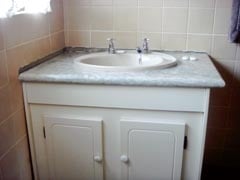Ask the Expert : Rear battening on worktops
In this regular column, Consultant Barry Hunt answers reader enquiries. If you have a question, email it to: nss@qmj.co.uk marked for Barry’s attention.
Q: Stone-topped kitchen islands stand alone, so why do I need rear-battening for units installed against walls?
It might be obvious, but I will say it anyway: kitchen islands do not have adjacent walls and thus there is not the opportunity for rear-edge battening. Otherwise, rear-edge battening for stone worktop installations is inexpensive and straightforward to install and helps to prevent so many potential problems from occurring that there really is no excuse not to include it. It provides additional or back-up support and rigidity to structures that should still be independently capable of supporting stone surfaces.
I believe your question stems from a general observation that kitchen islands do not seem to suffer problems. It would appear, though, that this is more to do with the fact that kitchen islands are freer to move than those against walls and abnormal stresses to stone surfaces are less likely to occur should the support prove wanting in any way.
But is this freedom to move of kitchen islands really sufficient?
Kitchen installations do not seem to take into account the strength of the support and the stability of the materials used for its construction.
Timber-based materials are the norm, especially fibre-particle boarding with a range of supposedly domestic life-resistant coatings. The problem with fibre-particle boards is that they are susceptible to dimensional changes, especially under the influence of water, which includes humidity changes. However good the coatings are, they do suffer damage, and moisture can then infiltrate, leading to all sorts of problems.
Where floors are mopped, some unit bases sitting directly on to these floors may suffer expansion and in some instances collapse. Similar problems occur around sink units where hidden sealant has failed or has not been installed correctly in the first place, so that water becomes trapped for prolonged periods. Subsequent swelling has resulted in some stone surfaces suffering cracking.
I am a cat owner and my furry friends have managed to open up the laminated surfaces of my own base units by their frequent rubbing, leaving them more susceptible to other influences. This is just one example of the seemingly strange but predictable domestic influences that need to be accounted for.
Children playing on top of kitchen surfaces, or workmen climbing on them to carry out other work are common issues that are entirely predictable, and thus the design should allow for such influences. Simply thinking such things should not happen and using them as excuses after the fact is not viable. Installations need to be fit for predictable domestic use in the same way as electrical and other appliances have to prove they are safe.
Kitchen islands need to be better designed and made of good quality materials to increase rigidity and potential longevity of service, given that rear-edge battening cannot be employed.
I am not convinced that fibre-based materials at the lower end of the quality range available for base units are truly suitable for supporting natural stone unless the weight is better distributed or even relieved by incorporating additional hidden supports. Don’t rely on the dead weight of the installation. Use some form of rigid attachment to the floor as an additional precaution. Where there are sinks or other sources of water, make sure there is proper protection and that it is maintained.
Reference: Natural Stone Kitchen Worktops. Code of practice for the design, manufacture, installation and maintenance of natural stone kitchen worktops etc. Published by Stone Federation Great Britain, Feb 2005.
Barry Hunt is a Chartered Geologist and Chartered Surveyor who has spent 20 years investigating issues relating to natural stone and other construction materials. He now runs IBIS, an independent geomaterials consultancy undertaking commissions worldwide to provide consultancy, inspection and testing advice. Tel: 020 8518 8646
Email: info@ibis4u.co.uk
The advice offered in answer to readers’ questions is intended to provide helpful insights but should not be regarded as complete or definitive. Professional advice should always be sought with all stone-related issues.

